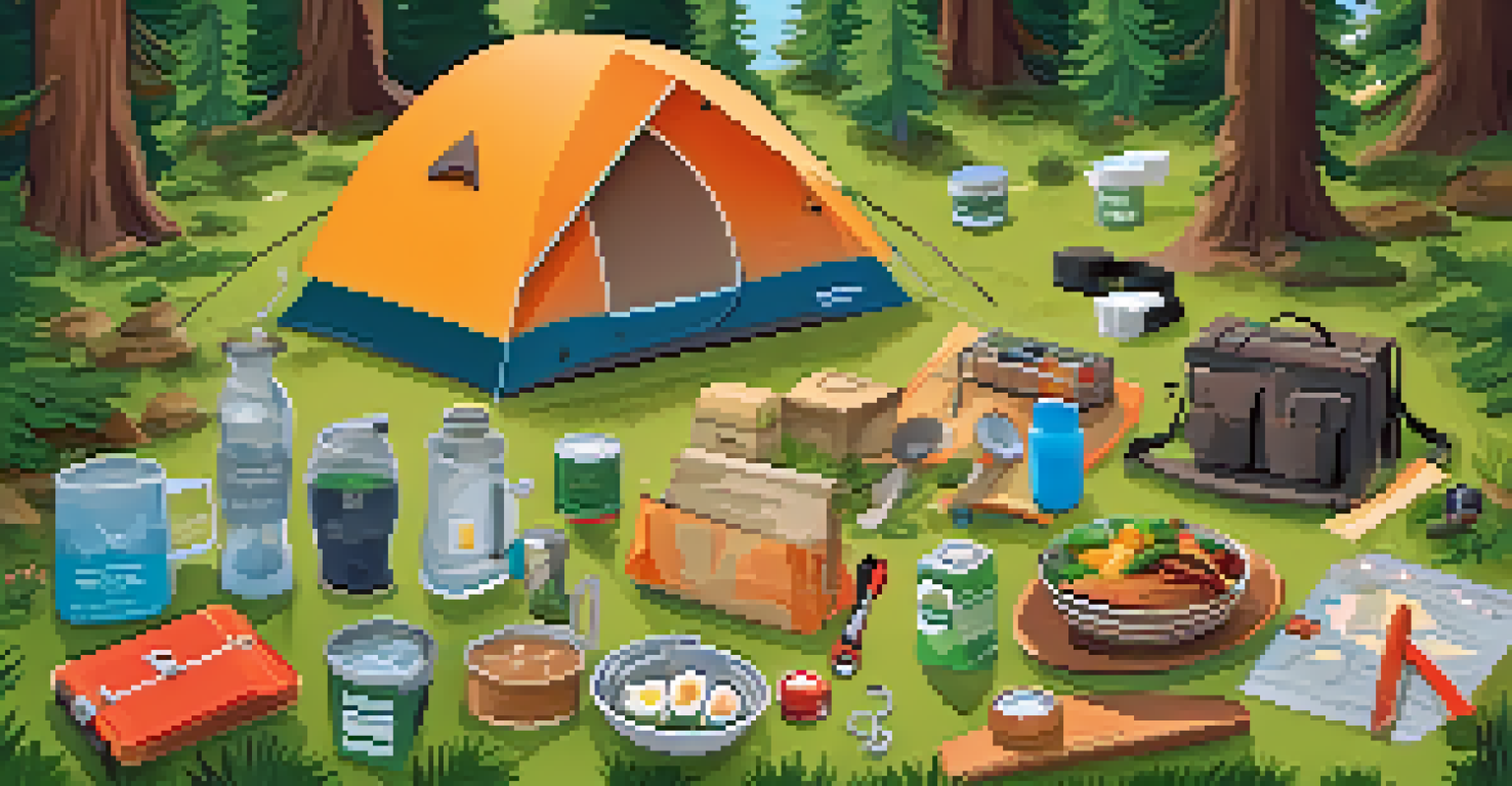Camping Safety: Essential Tips for a Secure Outdoor Trip

Plan Your Trip with Safety in Mind
Before heading out, make sure to research your camping location thoroughly. Understand the terrain, weather conditions, and any potential hazards that might be present. This preparation helps you pack the right gear and plan your activities accordingly.
In every walk with nature one receives far more than he seeks.
Creating a detailed itinerary is also crucial. Share this plan with friends or family who aren’t going with you. In case of an emergency, someone will know where to look for you, making it easier for rescuers to find you if necessary.
Lastly, consider your group's skill levels and experience. Choose a campsite that matches everyone's capabilities, ensuring a fun yet safe experience for all.
Pack Essential Safety Gear
Having the right gear can make all the difference in a camping trip. Essentials include a first aid kit, fire-starting tools, and a reliable flashlight. These items can help you respond to emergencies and navigate your surroundings safely at night.

Don't forget to pack a multi-tool or knife, which can be invaluable for a range of tasks, from food preparation to first aid. A good-quality map and compass are also essential, especially in areas with poor cell service.
Plan for Safety Before Camping
Thoroughly research your camping location, create a detailed itinerary, and consider your group's skill levels to ensure a safe and enjoyable experience.
Lastly, consider packing insect repellent and sunscreen. Protecting yourself from bites and sunburn can prevent discomfort and health issues during your trip.
Stay Aware of Your Surroundings
Being mindful of your environment is key to staying safe while camping. Take a few moments to observe the wildlife, terrain, and weather changes around you. This awareness helps you anticipate potential dangers, like sudden storms or animal encounters.
The earth has music for those who listen.
Also, familiarize yourself with local wildlife. Knowing what animals might be nearby can help you take precautions, such as securing food away from your sleeping area to avoid attracting unwanted guests.
Lastly, make a habit of checking in with your camping companions regularly. Keeping the lines of communication open can help ensure that everyone is safe and comfortable.
Follow Fire Safety Guidelines
Fires can enhance the camping experience, but they also come with risks. Always check local regulations regarding campfires, as some areas may have restrictions due to fire hazards. If fires are allowed, choose a designated fire pit and keep it small and manageable.
Make sure to gather firewood responsibly, avoiding live trees and protected areas. When the fire is lit, never leave it unattended, and ensure that children are supervised around the flames.
Pack Essential Safety Gear
Bringing essential items like a first aid kit, reliable flashlight, and food storage solutions can significantly enhance safety during your camping trip.
Finally, when it’s time to extinguish the fire, do it thoroughly with water and ensure that all embers are completely out. This prevents accidental wildfires and protects the environment.
Practice Food Safety in the Outdoors
Proper food handling is vital for a safe camping experience. Keep perishable items in a cooler with plenty of ice and avoid leaving food out in the open. This not only prevents spoilage but also keeps wildlife from invading your campsite.
Make sure to store food in bear-proof containers if you're camping in bear country. Even small animals can be persistent, so securing your food is essential to avoid unwanted visitors.
Always wash your hands before preparing or eating food. If water access is limited, bring hand sanitizer to maintain hygiene and prevent foodborne illnesses.
Know Basic First Aid Skills
While it’s great to have a first aid kit, knowing how to use its contents is equally important. Familiarize yourself with basic first aid skills, such as treating cuts, burns, and insect bites. This knowledge can help you react effectively in case of minor injuries.
Consider taking a first aid or CPR course before your trip. These skills can be lifesaving, especially in remote areas where professional help is not immediately available.
Respect Nature and Leave No Trace
Following Leave No Trace principles helps protect the environment, ensuring future campers can enjoy the beauty of nature just as you did.
Also, keep a list of emergency contacts and local medical facilities handy. In case of a serious injury, knowing where to go can save valuable time.
Stay Hydrated and Healthy
Hydration is crucial when spending time outdoors. Always carry enough water for your trip, and if you're in an area where you can refill, bring a reliable water purification method. Staying hydrated helps maintain energy levels and overall health during your adventure.
Plan your meals to include nutritious food options that provide the energy you need for hiking and other activities. Foods high in protein and carbohydrates are ideal for replenishing energy.

Lastly, listen to your body. If you're feeling fatigued or unwell, it’s essential to take a break, rest, and rehydrate. Ignoring these signs can lead to more serious health issues while out in nature.
Respect Nature and Leave No Trace
One of the most important camping safety tips is to respect the environment. Familiarize yourself with the Leave No Trace principles, which encourage responsible outdoor practices to protect nature. This includes packing out what you pack in and minimizing campfire impacts.
Be mindful of wildlife and maintain a safe distance. Feeding animals can alter their natural behaviors and put both them and you at risk. Observing them from a distance is not only safer but also more rewarding.
Lastly, take care of your campsite. Leave it as you found it, or even better. By preserving the beauty of nature, you ensure that future campers can enjoy the same experiences you did.